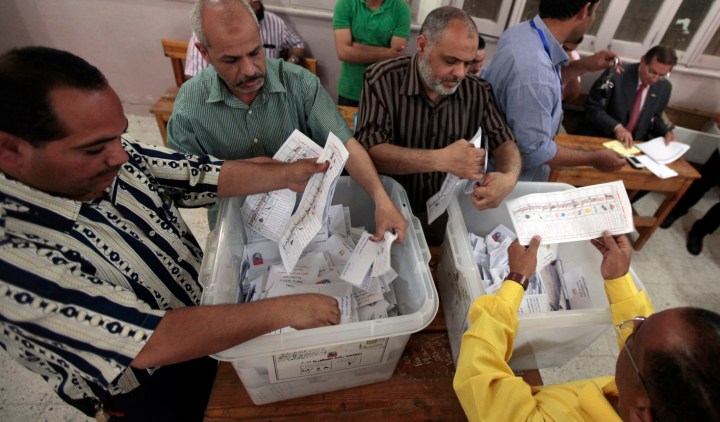Newsdeck
Brotherhood make claims as Egypt polls close

Millions of Egyptians, choosing their leader freely for the first time in their history, voted on Thursday with the Muslim Brotherhood saying their candidate had an early lead over fellow Islamists and rivals who served ousted President Hosni Mubarak. By Tom Perry and Tom Pfeiffer
Counting started after polls closed at 9 p.m. (1900 GMT) with no reliable exit polls available. The Brotherhood said on its television channel that its candidate Mohamed Mursi was ahead based on the tally from some districts.
The influential Islamist group, with its well-organised support base, had been expected to do well. Other candidates claimed to be ahead in a handful of areas, but the overall picture will not be clear for some time.
After six decades under military-backed rule, Egypt’s 50 million eligible voters were choosing whether to entrust the nation to an Islamist president for the next four years, alongside the Islamist-led parliament they elected earlier.
But secular figures such as ex-Arab League chief Amr Moussa, 75, and Mubarak’s last premier Ahmed Shafiq, 70, are in with a chance, appealing to Egyptians wary of radical change.
If no one wins more than half the votes needed for outright victory in Wednesday and Thursday’s first round, the top two candidates will contest a June 16 and 17 run-off.
Egyptians seemed increasingly polarised between those determined to avoid handing the presidency back a man from Mubarak’s era and those fearing an Islamist monopoly of ruling institutions.
Some voiced fears of a backlash on the streets, particularly if Shafiq, who like Mubarak was air force commander, triumphs. Protesters hurled stones and shoes at Shafiq when he voted in Cairo on Wednesday.
“If Shafiq or Moussa wins, they will create a revolution. Everyone will go down to Tahrir again,” said one voter, Sherif Abdelaziz, 30, who backs the Brotherhood’s Mursi, referring to the square in central Cairo where mass protests have been held.
Shafiq and Mursi supporters clashed in a village north of Cairo on Thursday, wounding five people, police sources said.
A page on Facebook, a medium used to devastating effect against Mubarak, was launched on Thursday threatening a “revolution if Moussa or Shafiq wins”.
The mother of Khaled Said, the activist whose death in 2010 at the hands of police helped galvanise anti-Mubarak protests, also derided “feloul”, or remnants of the old order.
“If any of the feloul win, it would be because the vote was rigged. Egyptians will never retreat from their revolution,” Said’s mother Leila told Reuters by telephone.
Mursi, 60, was pitched into the race after the Brotherhood’s first choice was disqualified. His main Islamist rival is ex-Brotherhood member Abdel Moneim Abol Fotouh, 60.
Leftist Hamdeen Sabahy, 57, is a dark horse in the race.
ANGRY ALLEGATIONS
As evening fell, Moussa made an 11th-hour appeal for Egyptians to head to the polls.
“Grab the chance of the last few hours to go down. It is vital that they vote … Go down, take part in building the new Egypt,” he said, walking near his campaign office.
He stopped to shake hands with motorists stuck in the jam created by the scene. “It’s the president,” shouted one woman.
Some voters voice disappointment with the performance of parliament, where the Brotherhood’s party has the biggest bloc. The assembly has been unable to assert itself over the government appointed by the generals who took over from Mubarak.
Alarmed by rising crime, disorder and a failing economy, some Egyptians favour a man with government or military experience, even if he harks back to the Mubarak era.
In an angry exchange as voting drew to a close, Moussa accused Shafiq of underhand methods and spreading “lies” that he had quit the race, saying Shafiq should withdraw himself.
Shafiq responded: “How can I pull out if all the voting centres say Amr Moussa is finished and … has no chance?”
Voters queued patiently, determined not to miss their chance to influence the first round. Election consultant Ossama Kamel said there were fewer abuses than in the parliamentary poll that ended in January, partly because of lessons learned then.
“We have seen a lot better control of campaigning on election day than during the parliamentary vote when there were lots of violations, with candidates and their supporters hustling people outside polling stations,” he told Reuters.
ARMY GRIP
The vote marks a crucial stage in a turbulent army-led transition racked by protests, violence and political disputes. The generals who took charge when Mubarak was ousted on Feb. 11, 2011, have pledged to hand over to the new president by July 1.
Even then the army, whose grip reaches deep into government and the economy, is likely to wield influence for years to come. A tussle over who should write the constitution also means the new president will not know his own powers when he is elected.
Egyptians accustomed to the routinely forged votes of Mubarak’s era have relished the uncertainty of the election.
“This is the first time we can really choose our president and no one will mess with the result,” said Ahmed Shaltout, a 36-year-old lawyer who said he would vote for Mursi.
The next president will face huge tasks in reviving Egypt’s wilting economy and restoring security. The sprawling police force, which virtually collapsed during the anti-Mubarak revolt, is only a shadow of its once-feared presence.
Security is Shafiq’s strongest card. A former aviation minister, he was appointed prime minister days before Mubarak fell and quit soon afterwards in response to popular protests.
He is also favoured by many of Egypt’s 10 percent Christian minority, fearful of the rising power of Islamists.
“We all need a president who will curb the Islamist or any other non-moderate current in society. Shafiq can do this because he will be a powerful president,” said Samuel George, a Christian in Alexandria, Egypt’s second city.
Mubarak, 84, is contemplating the spectacle of a free election from the upscale Cairo hospital where he is confined while on trial for ordering the killing of protesters and for corruption. A verdict is due on June 2, two weeks before any presidential run-off. A death sentence is possible but unlikely. DM
Photo: Officials count ballots for the presidential election after the polls were closed in the Mediterranean city of Alexandria, 230 km north of Cairo May 24, 2012. Egyptians, choosing their leader freely for the first time in history, voted for a second day on Thursday in an election that is a fruit of last year’s popular revolt against Hosni Mubarak. REUTERS/Mohamed Abd El-Ghany



















 Become an Insider
Become an Insider